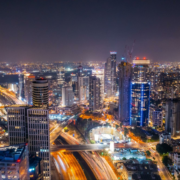Asia Pacific Records $131 Billion in Commercial Real Estate Investments in 2024

Commercial real estate (CRE) investment in Asia Pacific rose 23 percent year-on-year in 2024 to $131.3 billion, surpassing 2022 levels, according to data and analysis by global real estate consulting firm JLL. Q4 volumes rose 10 percent year-on-year and reached $34.9 billion, marking the fifth consecutive quarter of year-on-year growth for the region.
All major property sectors recorded full-year volume growth, with the highest quarterly cross-border volume recorded since the end of 2021. Strong cross-border investment volumes totalled $23.8 billion in 2024, a 43 percent year-on-year increase from this time last year. This surge in cross-border investment was underpinned by strong interest in office and logistics assets from overseas investors in key markets like Australia, Japan, and Singapore.
Japan continues to be an extremely active market in the region, recording $10.7 billion in Q4 trades, a 145 percent year-on-year increase driven by strong demand for logistics and office properties. Despite interest rates being on an upward trajectory, investors adopted value-add strategies to mitigate rising debt costs, further fuelling market activity.
“The fifth consecutive quarter of annualised growth for Asia Pacific commercial real estate is a testament to the region’s enduring resilience,” said Stuart Crow, CEO, Asia Pacific Capital Markets, JLL. “Despite differences across each market, investors are finding new opportunities as valuations stabilise and borrowing conditions ease. Looking ahead, we expect 2025 to be a strong year for market entry, with early movers likely to benefit from a less competitive landscape, particularly in key sectors like office and logistics.”
The office sector across Asia Pacific continued its strong rebound, with strong tenant demand likely to have helped individual markets maintain growth momentum. Office investment volumes reached $48.8 billion in 2024, marking a 12 percent year-on-year increase. In Q4, South Korea led the region in office investment volume, supported by a favourable environment created by declining senior loan rates for prime office buildings. As large-scale financing remained challenging, investors showed a clear preference for medium-sized, stabilised assets.
Logistics remained a favoured asset class, with strong demand driving large portfolio transactions in Japan, Australia, and India, leading to yield compression in the sector. Both domestic and overseas investors remained bullish about Japan logistics due to rental growth. Logistics volumes in Australia also rebounded, particularly in gateway markets Sydney and Melbourne.
Within the retail sector, volumes grew 28 percent year-on-year in 2024, with private capital dominating purchases in Australia and Singapore’s prime retail market seeing sustained rental growth. South Korea saw corporates lead investment, focusing on value-add opportunities.

Despite the uncertainties introduced by the U.S. administration’s fiscal policies and the Federal Reserve’s decision to hold interest rates steady this month, Asia Pacific remains a compelling destination for global capital,” said Pamela Ambler, Head of Investor Intelligence, Asia Pacific, JLL. “While debt markets navigate restrictive rate expectations, property valuations in the region are resetting, creating compelling opportunities for strategic investors. With central banks beginning their rate reduction cycles and the region’s improving transparency, Asia Pacific offers a robust case for long-term investment and sustained growth.”

















